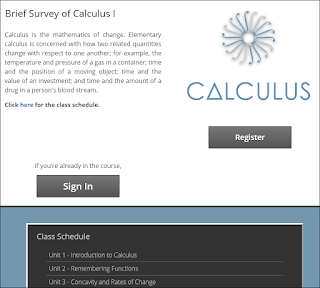by Suraj
Uttamchandani, Tristan Tager, and Daniel Hickey
We discuss our recent pilot of networked online approaches for providing supplemental instruction for learners in Calculus. This work responds to the raging debate over how to respond to underprepared college entrants who are at high risk for failing "gateway" introductory courses, particularly in STEM and composition. Placing such students in remedial Developmental Education (DE) courses generates tuition revenue and fits within the existing course structure. But decades of research show that this approach does not work and that many of these student never move from this "remedial ghetto" into credit-bearing courses, and fewer still go on to graduate. Most now argue for providing peer-assisted Supplemental Instruction (SI) to support all students in challenging gateway courses. But because SI does not generate tuition, it draws from existing instructional resources. Additionally, SI requires space, scheduling, and supervision that many schools struggle to sustain. In this blog post we introduce an alternative approach to supplemental instruction that draws from recent advances on participatory and networked approaches to online learning.



